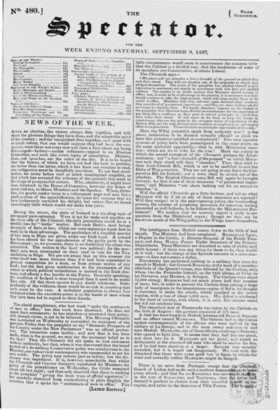The placid pamphleteer, who last week "spoke the sentiments of
men in office,' has this week been disowned. He does not Speak their sentiments; he has mistaken or misstated their policy; and, though clever, is not to be believed. The Morning Chronicle was instructed on Wednesday to contradict its statement of the previous Friday that the pamphlet on the "Domestic Prospects of the Country under the New Parliament" was an official production. The correction came tardily ; and now that it has been made, what is the general, we may say the universal belief as to the fact? That the Chronicle did not make its first statement Without authority, but that, when it was discovered that the broad avowal of a do-nothing Conservative policy was mischievous to the Ministry, our subservient contemporary was commanded to eat his own words. The policy may remain just as before; but the disclosure was imprudent. It is, however, remarkable that whilst the Chronicle and Courier distinctly repudiated for Ministers the Policy of the pamphleteer on Wednesday, the Globe remained Silent till last night; and then only observed that there is nothing In the pamphlet "giving the least trace of official mysteries,"— but carefully abstained from contradicting in plain English the assertion that it spoke the " sentiments of men in office." This little circumstance would seem to countenance the common belie that the Cabinet is a divided one; that the tendencies of some of its members are Conservative, of others Liberal.
The Chronicle says— "Ministers will not abandon a hair's breadth of the ground on which they took their stand. They will not abandon one of the principles to which they pledged themselves. The writer a the pamphlet has allowed himself to give expression to sentiments not exactly in accordance with this firm and decided conduct. The country is no doubt anxious that Ministers should remain hi office; but, in order to be of advantage to the country, it is necessary tint they should continue to take the high gtound, which will alone enable them to be useful in office. Ministers have over and over again declared what measures they considered of paramount importance ; and they are abore looking out for an excuse to abandon them. We would, therefore, impress on the readers of the pamphlet, that Ministers have afforded no countenance for the expression of any thing like a readiness on their part to retract principles on which they have taken their stand. It will never do for them to keep the Tories in countenance, who one day spoke in the strongest terms of reprobation of the Reform Bill, and the next declared their readiness to conform to it, and to give effect to its provisions. Those who have no principles may readily profe,s any."
Does the Whig journalist speak from authority now? is the above declaration to be deemed virtually official? or shall we have this statement qualified or contradicted? Two very opposite systems of policy have been promulgated in the same paper, on the same authority apparently,—that is, with Ministerial sanction: which are we to take for the true ? Mark the extent to which the second statement of the Chronicle pledges the Administration: not "a hair's breadth of the ground" on which Ministers took their stand will they "abandon." Then they stick to their Irish Church Bill, which is not to be modified to suit the Duke of WELLINGTON. They are not going to cut down the Corporation Bill for Ireland ; nut a town shall be struck out of the schedule. The English Church-rates Bill will again be brought forward; for that is one of their measures "of paramount importance," and Ministers "are above looking out for an excuse to abandon" it.
Will the official Chronicle go a little further, and tell us what Ministers will do if all or any of these measures are rejected?
Will they resign? or is the pear-ripening policy, the bombarding process, the scheme of preparing measures for rejection, having succeeded so well hitherto, to be followed in the MELBOURNE Parliament? We confess that we scarcely expect a reply to our question from the Ministerial organ ; though we dare say he knows as much of the Whig policy as the Whigs know themselves.


























